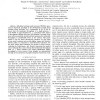Free Online Productivity Tools
i2Speak
i2Symbol
i2OCR
iTex2Img
iWeb2Print
iWeb2Shot
i2Type
iPdf2Split
iPdf2Merge
i2Bopomofo
i2Arabic
i2Style
i2Image
i2PDF
iLatex2Rtf
Sci2ools
91
Voted
GLOBECOM
2007
IEEE
2007
IEEE
Design of High Throughput Scheduled Mesh Networks: A Case for Directional Antennas
Abstract— Scheduled wireless mesh networks (WMNs) represent an important paradigm in the development of high speed wireless access networks. As a consequence of [1], it can be shown that the maximum throughput of a single gateway n node WMN is upper-bounded by 1 n , normalized with respect to the highest available data-rate. The situation is actually worse since with conventional omni-directional antennas, the achievable throughput is considerably lower at low powers. This paper makes a case for smart (directional) antennas. For the same power, smart antennas can provide higher range, and therefore shorter paths, as compared to omni-directional antennas. For the same range, smart antennas can operate at lower powers, reducing the interference, and thereby improving the spatial reuse. Although they cannot change the fundamental throughput limit of 1 n , smart antennas can achieve significantly higher throughput at lower powers, These insights are demonstrated through several numerica...
Related Content
| Added | 02 Jun 2010 |
| Updated | 02 Jun 2010 |
| Type | Conference |
| Year | 2007 |
| Where | GLOBECOM |
| Authors | Skanda N. Muthaiah, Aravind Iyer, Aditya Karnik, Catherine Rosenberg |
Comments (0)

